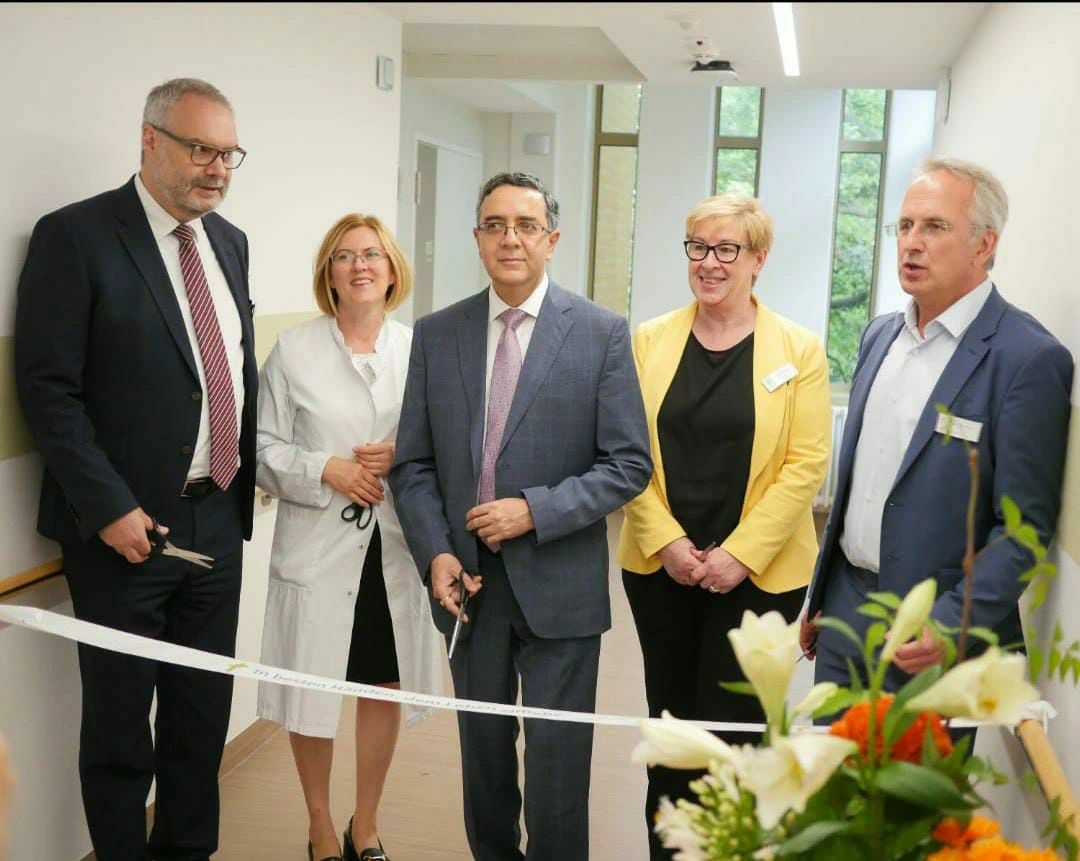Picture Credit: Embassy of India, Berlin
Germany has taken a landmark step in integrative healthcare with the inauguration of its first inpatient Ayurveda unit at Immanuel Hospital Berlin. Opened on September 17, the Immanuel Ayurveda Centre was launched by India’s Ambassador to Germany, Ajit Gupte, alongside German partners, highlighting Ayurveda’s rising acceptance as part of global healthcare and Indo-German collaboration.
A Milestone for Integrative Medicine
The new centre, developed by Immanuel Albertinen Diakonie, offers both inpatient and outpatient care, combining Ayurveda’s holistic therapies with modern medical practices. It will provide treatments for chronic conditions including stress disorders, musculoskeletal problems, and lifestyle-related illnesses.
At the inauguration, Ayurveda consultant Elmar Stapelfeld described Ayurveda as “a medicine of the heart,” reflecting the human-centered philosophy of the practice. The opening ceremony featured lectures in German and English, Ayurvedic cuisine, and cultural performances with sitar and tabla, showcasing the blend of Indian tradition with German medical culture.
Ambassador Gupte underlined that the initiative represents more than a medical milestone: it also symbolizes “the cultural, scientific, and political partnership between India and Germany.”
Ayurveda’s Footprint in Germany
Although Ayurveda has been practiced in Germany for decades through wellness resorts, private clinics, and training academies, the Berlin initiative is the first inpatient integration within a hospital setting.
Prominent centres such as the European Academy of Ayurveda (REAA) near Frankfurt and the Maharishi Ayurveda Kurzentrum Bad Ems have already been catering to patients with treatments like Panchakarma. However, according to German healthcare regulations, Ayurveda is not officially recognized as an independent medical system. Practitioners who wish to diagnose or prescribe therapies must hold a Heilpraktiker (natural health practitioner) license. Indian graduates with a BAMS (Bachelor of Ayurvedic Medicine and Surgery) degree cannot practice directly unless they acquire this license, meaning most Ayurveda in Germany has so far been offered as non-medical wellness services, such as massage, diet, and lifestyle counselling.
The Berlin unit therefore marks a significant shift towards Ayurveda being treated as a credible part of integrative medicine in Germany.
Expanding Market and Consumer Demand
Ayurveda’s popularity in Germany is also reflected in its rapid market expansion. According to Market Size & Trends, 2024 reports, the German Ayurvedic preparations market was valued at USD 1.0 billion in 2024 and is projected to reach USD 2.1 billion by 2033, growing at a CAGR of 9.7%.
The Ayurvedic medicines and healthcare products segment is expected to rise from USD 0.5 billion in 2024 to USD 1.3 billion by 2033, with an even higher CAGR of 11%. Demand is especially strong in urban centres such as Berlin, Munich, and Hamburg, where consumers are turning to natural remedies, preventive healthcare, and sustainable wellness products.
Surveys cited in the reports indicate that nearly 40% of Germans are aware of Ayurveda, though many see it more as a wellness practice than a medical system. Users tend to be educated, health-conscious, and from higher-income groups, with women forming a significant share of the consumer base.
Regulation and Innovation
Germany’s regulatory environment, shaped by EU frameworks and enforced by the Federal Institute for Drugs and Medical Devices (BfArM), requires Ayurvedic medicines and products to comply with strict standards on safety, transparency, and efficacy. Companies must meet Good Manufacturing Practice (GMP) guidelines and provide evidence-based claims, which has raised the barrier to entry for new players.
Despite these challenges, innovation is reshaping the sector. According to Market Size & Trends, technologies such as AI-driven formulations and IoT-enabled health monitoring are opening new possibilities for personalized Ayurvedic solutions. Younger consumers, particularly millennials and Gen Z, are driving demand for organic skincare, herbal supplements, and wellness apps that integrate traditional knowledge with digital platforms.
Indo-German Cooperation in Traditional Medicine
The Berlin centre also reflects a broader movement in Indo-German healthcare collaboration. Organizations such as the Ayurveda Dachverband Deutschland (ADAVED), founded in 2019, and the German Ayurveda Foundation, established in 2024, have been working to promote Ayurveda’s scientific recognition and policy support. Meanwhile, India’s Ministry of AYUSH has actively partnered with German institutions on research, education, and awareness-building.
The opening of the Immanuel Ayurveda Centre stands as a symbol of this cooperation, positioning Germany as a European hub for integrative and preventive medicine—a model where ancient Indian wisdom meets modern German medical excellence.
Industry Leaders in the German Market
According to Market Size & Trends, 2024 industry analysis, the German Ayurvedic preparations and medicines market is shaped by both Indian multinationals and domestic players. Leading Indian companies such as Dabur, Himalaya Drug, Emami Group, Maharishi Ayurveda, and Patanjali Ayurved have established strong brand recognition in Germany.
In addition, legacy Indian names like Vicco Laboratories, Baidyanath, Charak Pharma, and Shahnaz Husain Group continue to hold a share of the consumer wellness segment. Smaller but fast-growing players, including Amrutanjan Healthcare, Herbal Hills, and Basic Ayurveda, are focusing on niche areas such as organic wellness teas and Ayurvedic skincare.
Domestic German initiatives, supported by organizations like ADAVED and the German Ayurveda Foundation, are working in parallel to promote local manufacturing and research collaborations that meet EU safety and GMP standards.
Together, these players are shaping Germany’s fast-growing Ayurvedic sector, making it a test case for the integration of traditional medicine within Europe’s healthcare landscape.



